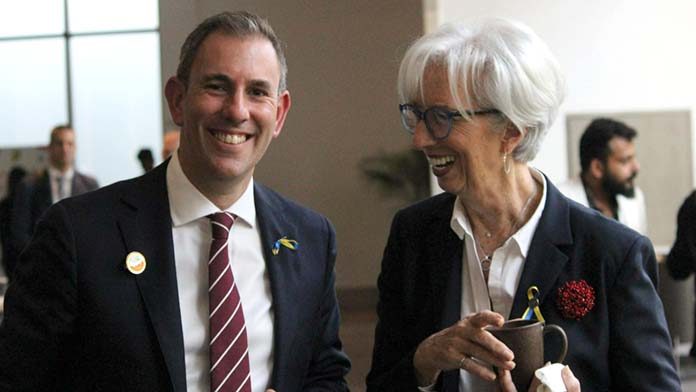Labor Treasurer Jim Chalmers has followed in the footsteps of previous Labor ministers, including Prime Minister Kevin Rudd in 2009 and Treasurer Wayne Swan in 2012, by penning a theoretical article in the pages of the Monthly magazine. With each essay the theoretical coherence and aspirations, never high, have sunk.
Rudd’s essay came at the very height of the global economic crisis in February 2009 as banks collapsed and stock markets fell in the worst recession since the 1930s Depression.
The enormous fiscal packages and bailouts implemented by governments across the globe managed to stabilise the world economy but did nothing to solve the fundamental crisis in profitability.
They kicked the crisis down the road and much of the economic growth that occurred in the following 15 years centred on even more financial speculation, while living standards have stagnated and even dropped for most of the world’s population.
Chalmers’ essay recognises the even darker clouds of instability that now face us, with the havoc created by COVID and inflation. Yet Chalmers offers no solutions. There is a complete mismatch between his recognition of the storms facing humanity and Labor’s economic policy ambitions, which amount to a forlorn hope that capitalists will start to invest based on “values not value”.
Chalmers cites economist Nouriel Roubini to talk about the interlocking “mega threats” we face: rising inflation with slowing growth, economic inequality and workers displaced by technology, government debt, the rise of extreme right parties, a new cold war and climate disaster leading to falling living standards and displaced people.
Fluffy rhetoric
So what does Labor propose to do to protect us from impending economic, imperialist and climate barbarism? Beyond Chalmers’ fluffy rhetoric of a “new, values-based capitalism for Australia” there is precious little.
First, he proposes “strengthening” institutions such as the Reserve Bank of Australia and the Productivity Commission. Yet both institutions are products of neoliberal deregulation implemented by Paul Keating and John Howard as they drove disastrous policies of corporatisation and privatisation to boost profits as the market ripped through healthcare, education and housing.
Second, he proposes to “measure what matters” by adding wellbeing into the budget.
With the right metrics and guided by government, Chalmers argues, corporations will start to invest for social and climate need, not profits.
And finally Chalmers talks about public/private co-investment in the industry, housing and electricity sectors. On housing, for instance, with 437,000 households already in need of social housing and an acute affordability crisis in the private rental market, Labor’s Housing Australia Future Fund proposes to borrow $10 billion to invest in the stock market.
The proceeds (they hope) from this gambling exercise will go towards funding up to 30,000 social housing homes and 10,000 affordable rentals in the first five years.
As The Greens rightly point out, under this policy the housing crisis is certain to get worse.
Instead of taxing corporate profits to fund genuine social democratic reforms, Labor wants to rely on the capitalist market.
Chalmers claims, “the private sector is key and central to sustainable growth, and there’s a genuine appetite among so many forward-looking businesspeople and investors for something more aligned with their values, and our national goals.”
Chalmers has learned nothing from the Royal Commissions into aged and disability care that exposed the abuse and abject denial of human dignity that results from allowing the profit motive to determine care for the most vulnerable.
Economic instability
It is capitalism’s drive for profit that underpins the crises Chalmers’ cites—the economic instability, the new cold war with China and the climate catastrophe. Yet Chalmers’ essay asks us to watch government fold its arms and hope that capitalists will do the right thing.
Chalmers notes the, “reality of our fiscal position—the federal budget is deep in debt and under pressure—so the options for large, broad new programs are limited.” He recognises some of the intractable problems that capitalism has created but is incapable of breaking from the neoliberal script to solve any of them.
Chalmers doesn’t mention the stage 3 tax cuts worth $15.7 billion per year that are due to come into effect in July 2024. Fifty per cent of the tax cuts will go to the top 10 per cent of taxpayers.
Chalmers could scrap the tax cuts. He could also scrap the nuclear submarines and use the $179 billion to fund pay rises, climate action and public housing. But he is committed to running capitalism when it needs to be overthrown.
By Jean Parker






